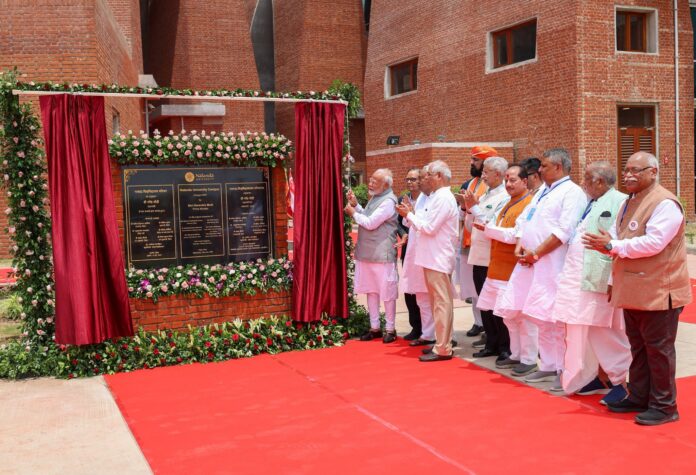New Delhi, June 19: Prime Minister Narendra Modi on Wednesday inaugurated the new campus of Nalanda University near Rajgir, Bihar, located close to the site of the ancient ruins of Nalanda.
Nalanda University, established by an Act of the Parliament of India, aims to revive the ancient glory of the historic Nalanda as an international institution for pursuit of intellectual, philosophical, historical, and spiritual studies.
Speaking at the inauguration, the PM said: “Nalanda is a symbol of India’s academic heritage and vibrant cultural exchange. It is not just a renaissance of India’s past, but the heritage of many countries are linked to this place,” he said.
“Our government is working towards making the country’s higher education system more advanced and research-oriented. I am confident that our youth will provide leadership to the entire world in the future,” Modi said.
He said education is an important tool for the development and prosperity of any country.
“To achieve the goal of a developed nation by 2047, educational institutions are being upgraded to global standards across the country,” the Prime Minister said, adding that all developed countries achieved the present status only due to their rich educational facilities.
Modi said the ancient Nalanda University was ruined by invaders and set ablaze with its rich library.
The Prime Minister said his government was committed to provide all assistance to the newly revived Nalanda University to develop it as a global centre of quality education and wisdom once again.
The government had already announced creation of research fund of Rs 1 lakh crores.
Modi said an IIT Delhi campus has been opened in Abu Dhabi, and similarly, a campus of IIT Madras has opened in Tanzania, adding that it was expected that the campus of the revived Nalanda University would also be opened in important cities across the globe in the days ahead.
Bihar Chief Minister Nitish Kumar, while addressing the function, said then President APJ Abdul Kalam was the one who suggested the ancient Nalanda University be revived. On his suggestion, with the initiative of the Bihar government and the active cooperation of the Centre, ancient Nalanda University was revived.
External Affairs Minister S Jaishankar also recalled the fame of the ancient Nalanda University as the seat of knowledge. He expressed his happiness that several countries had expressed their interest in the revival and development of Nalanda University as a world-class educational institution again.
The PM also planted a sapling of the Bodhi tree – an enduring symbol of Buddhist heritage and Indian spirituality, at the campus.
Bihar Governor Rajendra Vishwanath Arlekar, Chief Minister Nitish Kumar, External Affairs Minister Jaishankar, MoS for External Affairs Pabitra Margherita and Chancellor of the University, Prof. Aravind Panagariya were among the dignitaries present on this occasion.
The Nalanda University Act provides the basis for implementing the decisions arrived at the 2nd East Asia Summit (EAS) (Philippines, 2007) for establishment of NU and at the 4th East Asia Summit (Thailand, 2009). While the Nalanda University Act was passed by Parliament in 2010, construction of the present university began in 2017.
The University adds meaning to India’s ‘Act East’ Policy.
Along with India, there are 17 Participating Countries in this endeavour – Australia, Bangladesh, Bhutan, Brunei Darussalam, Cambodia, China, Indonesia, Laos, Mauritius, Myanmar, New Zealand, Portugal, Singapore, South Korea, Sri Lanka, Thailand, and Vietnam. Ambassadors of these countries travelled to Nalanda to participate in the inaugural ceremony, a statement said.
The design and architectural elements of the new 455-acre campus are inspired by the original monasteries and buildings at the ancient Nalanda Mahavihara.
The new campus is also a ‘Net Zero Green Campus’ and includes over 100 acres of water bodies (Kamal Sagar ponds), an on-grid solar plant, a domestic and drinking water treatment plant, and a water recycling plant for reusing wastewater as well as over 100 acres of green cover. The University also has a 250-capacity Yoga Center, a state-of -the-art auditorium, library, an archival centre and a fully equipped sports complex.
The University places emphasis on higher education and research, and offers Post Graduate and Doctoral programs in Buddhist studies, philosophy and comparative religions; languages and literature; ecology and environmental studies; sustainable development and environment; and, international relations and peace studies. At present, students from over 20 countries, including India, are enrolled in various courses at the University.








